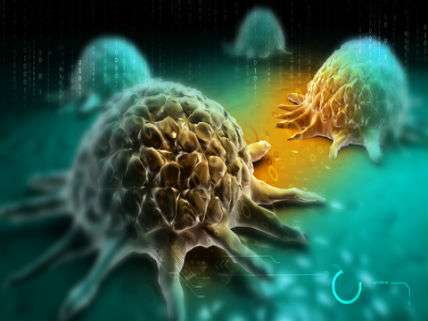Biggest Cause of Cancer? Just Plain Old Bad Luck
And your luck gets worse the older you get.

A new article in Science is reporting that most cancers in people are the result random copying errors that occur when cells in the body divide. Applying some sophisticated mathematics to the question of how the mutations that lead to cancers are produced, Johns Hopkins University cancer researchers Cristian Tomasetti and Bert Vogelstein, sought to figure out what causes 32 different types of cancers. The press release accompanying the report notes that when the two researchers looked "across all 32 cancer types studied, the researchers estimate that 66 percent of cancer mutations result from copying errors, 29 percent can be attributed to lifestyle or environmental factors, and the remaining 5 percent are inherited."
Additionally, they calculated how big a role random errors played for various types of cancers. For example, when critical mutations in pancreatic cancers are added together, 77 percent of them are due to random DNA copying errors, 18 percent to environmental factors, such as smoking, and the remaining 5 percent to heredity. For prostate, brain or bone cancers, more than 95 percent of the mutations that lead to malignancy are due to random copying errors. However, environment does play a big role in lung cancer in which 65 percent of all the mutations are mostly due to smoking, and 35 percent are due to DNA copying errors. Inherited factors are not known to play a role in lung cancers.
The risk of cancer goes up with age. People over age 65 account for 60 percent of newly diagnosed malignancies and 70 percent of all cancer deaths. Why? Because their bodies have experienced many more cell divisions and thus have had greater chances for the sort of random genetic errors that lead to cancer to occur.
Given that Americans face a lifetime risk of around 40 percent of suffering from cancer, what can be done? The researchers note: "Early detection and intervention can prevent many cancer deaths. Detecting cancers earlier, while they are still curable, can save lives regardless of what caused the mutation. We believe that more research to find better ways to detect cancers earlier is urgently needed."


Show Comments (12)